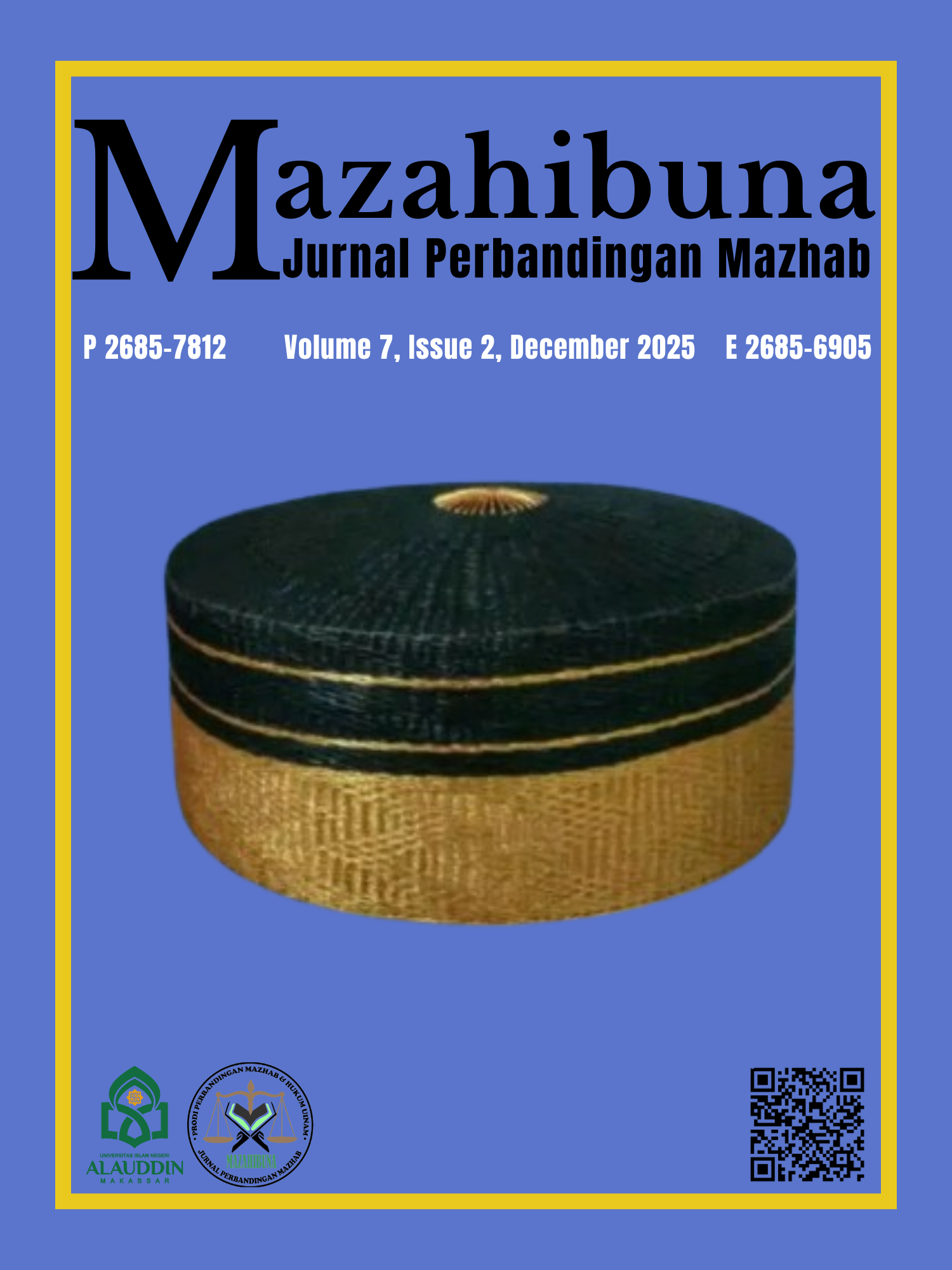The Dialectical Interplay of Ikhtilāf al-Ṣaḥābah (Companions’ Disagreements)
The Constructive Role of Diversity in Early Islamic Jurisprudence
DOI:
https://doi.org/10.24252/mazahibuna.vi.55188Keywords:
Juridical DisagreementsAbstract
This study examines the factors underlying juridical disagreements among the Prophet’s Companions, aiming to challenge the perception that such differences were inherently divisive and instead highlighting their constructive role in the development of Islamic jurisprudence. Using a qualitative descriptive-analytical approach based on library research, the study analyzes classical and modern sources to identify both internal factors, such as variations in linguistic interpretation, reasoning methods, and levels of knowledge, and external factors, including geographical, social, and political contexts, that shaped the Companions’ interpretations of the Qur’an and Hadith or guided their ijtihad when explicit scriptural evidence was absent. Case studies such as the ruling on triple divorce, the punishment for drinking khamr, and the timing of the ‘Asr prayer at Banu Qurayzah demonstrate the diversity of legal opinions that emerged in early Islam. The originality of this research lies in its emphasis on the dialectical interplay between internal and external dynamics, moving beyond simplistic views of disagreement as conflict. The findings imply that the Companions’ differences should be understood as intellectual diversity and tolerance within the classical fiqh tradition, offering valuable insights for contemporary discussions on Islamic legal thought.
References
Abdullaieva, T., Gafuri, R., Akhatov, H., & Aga, K. (2021). Problems of Interpreting the Main Types of Hadith in Terms of Their Correct Understanding. Linguistics and Culture Review, 5(June), 385–398. https://doi.org/10.37028/lingcure.v5nS4.1560
Aisy, A. R., Azzahrani, A., Setyanto, B. A., Setiawan, D. A., & Najmuddin, D. (2023). Sanksi Terhadap Pelaku Jarimah Khamr dalam Perspektif Hukum Pidana Islam. Jurnal Kajian Agama Dan Dakwah, 2(1). https://ejournal.warunayama.org/index.php/tashdiq/article/view/1650
Al-Amin, I. (2007). Manhaj Al-Naqdi fi Tafsir.
Al-Khatib, M. A. (1997). Usul al-Hadis. Gaya media Pratama.
Al-Munjid, N. al-D. (1999). Al-Musytarak Lafdzi fi al-Qur’an al-Karim. Dar al-Fikr.
Al-Qardhawi, Y. (2018). Madkhal li Dirasah al-Syariah al-Islamiyyah (Cet. 5). Maktabah Wahabah.
Al-Qaththan, M. (1989). Al-Tasyri wa al-Fiqh di al-Islam. Dar al-Ma’arif.
Al-Shabbaghal, M. (1972). al-Hadits al-Nabawi. al-Maktab al-Islam.
Al-Suyuthi, J. (2005). Tadrib al-Rawi. al-Muassasah al-Risalah.
Al-Zuhaili, W. (1986). Ususl al-Fiqh al-Islami. Dar al-Fikr.
Anam, W., & Ilaina, R. (2023). Problematika Autentifikasi Hadis Periode Sahabat: Antara Keadilan dan Intrik Politik. Jurnal Empirisme, 32(1). https://doi.org/https://doi.org/10.30762/empirisma.v32i1.836
As-Sayyid Salim, A. M. K. (2012). Shahih Fiqih Sunnah: Ilmu Fiqih pada Zaman Sahabat. Pustaka at-Tazkia.
As-Shiddiqiey, H. (1992). Pengantar Hukum Islam. Bulan Bintang.
Azharuddin, Irham, M. I., & Wanto, S. (2024). Sighat Talak: Studi Perubahan Sosial Masyarakat Pada Kekhalifahan Umar Ibn Khattab. Maqasidi: Jurnal Syariah Dan Hukum, 4(1). https://doi.org/10.47498/maqasidi.v4i1.3002
Gafur, A. A. (2008). Hukum Islam Dinamika dan Perkembangannya di Indonesia. Kreasi Total Media.
Hadi, A., & Muhammad, A. S. (n.d.). Ikhtilaf Shohabah: Asbabuhu wa Atsaruhu fi Fiqhil Islam. Maktabah Madbuli.
Hasan, A. (n.d.). al-Nahwu al-Wafi. Darel Ma’rifah.
Hussein, I. (1971). Perbandingan Mazhab dalam Masalah Nikah, Thalaq dan Ruju’. Balai Pustaka dan Perpustakaan Islam.
Ibnu Hajar Al-Asqalani. (2013). Bulugul Maram dan Dalil-dalil Hukum. Gema Insani.
Ikhsan, M. (2016). Membedah Faktor-faktor Penyebab Terjadinya Ikhtilaf di Kalangan Ulama. Nukhbatul ’Ulum, 2(1), 1–29. https://doi.org/10.36701/nukhbah.v2i1.10
Junah, A. K. (n.d.). Al-Qur’an dalam Pandangan Sahabat Nabi. Gema Insani Press.
Downloads
Published
How to Cite
Issue
Section
License
Copyright (c) 2025 Sinta Hardiyanti Utami, Esya Heryana, Mutiara Fajriyah

This work is licensed under a Creative Commons Attribution 4.0 International License.

This work is licensed under a Creative Commons Attribution 4.0 International License.
Authors who publish with Mazahibuna: Jurnal Perbandingan Mazhab agree to the following terms:
- Authors retain copyright and grant the Mazahibuna: Jurnal Perbandingan Mazhab right of first publication with the work simultaneously licensed under Creative Commons Attribution License (CC BY 4.0) that allows others to share the work with an acknowledgment of the work's authorship and initial publication in this journal.
- Authors can enter into separate, additional contractual arrangements for the non-exclusive distribution of the published version of the work (e.g., post it to an institutional repository or edit it in a book), with an acknowledgment of its initial publication in this journal.
- Authors are permitted and encouraged to post their work online (e.g., in institutional repositories or on their website) before and during the submission process, as it can lead to productive exchanges, as well as earlier and greater citation of published work.










